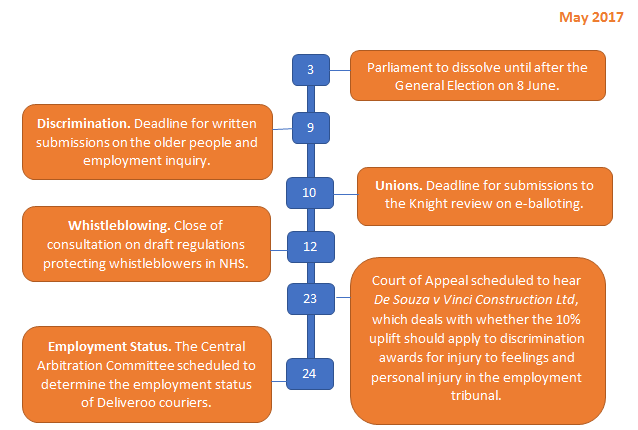General election. Parliament will be dissolved on 3 May prior to a snap general election to be held on 8 June. Although it was previously thought that the Finance Bill would be pushed through unamended, the government has in fact dropped the changes to the taxation of termination payments (as well as other controversial measures of less interest to employment lawyers) as part of the “wash-up”, to ensure that essential parts of the Bill are passed before dissolution. If there is no change in government we expect to see this in another Finance Bill later this year. The Public Sector blog contains more information on the wash-up process.
Discrimination. In the conjoined cases of Essop and Naeem, the Supreme Court restored orthodoxy following the Court of Appeal’s controversial ruling, and held that in cases of indirect discrimination, there is no need to establish the reason for the “particular disadvantage” suffered by the protected group. The EAT has also held that a woman who was dismissed during maternity leave, under the employer’s policy of dismissing anyone who had not been paid for three months, had not suffered pregnancy and maternity discrimination. The government has also published its response to the report on high heels and workplace dress codes, effectively ruling out further legislation but promising further guidance and awareness-raising.
Gender pay gap. The Equality Act 2010 (Gender Pay Gap Information) Regulations 2017 are now in force, introducing mandatory gender pay gap reporting for large private and voluntary sector employers who will be required to publish annual gender pay gap information, and post the data to a government website, which is now live.
Tribunal fees. Further calls have been made to reduce employment tribunal fees, this time by the parliamentary Joint Committee on Human Rights, which has published a report saying current fees “are a barrier to victims seeking justice”.
Discipline and dismissal. The Court of Appeal held that poor attitude to organisational change could constitute gross misconduct and upheld a dismissal on this ground. An employment tribunal awarded a claimant only £2 compensation for breach of the right to choose their companion at a disciplinary hearing.
TUPE. The EAT has considered the scope of employee liability information under TUPE, and held that it includes both contractual and non-contractual terms of employment and therefore it did not matter that a transferor had mis-labelled a contractual Christmas bonus as being non-contractual.
Minimum wage. The EAT has set out how to determine whether a worker who is on overnight “sleep-in” duty is working for the purposes of the national minimum wage.
In other news, foster carers are seeking employment status, the Home Office has published information on the status of EU nationals in the UK, Labour pledged £10 an hour minimum wage by 2020, Mathew Taylor proposed employers pay premium rate for zero hours contracts and a Welsh Assembly Committee supported proposals put forward for the rejection of parts of the Trade Union Act.
In our blog, Marian Derham and Sarah Verrecchia look at lessons from the Court of Appeal on long-term sickness dismissals, Samuel Nicholls looked at the implications for employers of industrial action and employees’ journeys to work and Colin Leckey looked at how Simpson’s Paradox may affect gender pay gap data.
Next month
Key developments to look out for in May 2017.

For recent and forthcoming developments, don’t forget What to expect in employment law, Case tracker and Legislation tracker.


